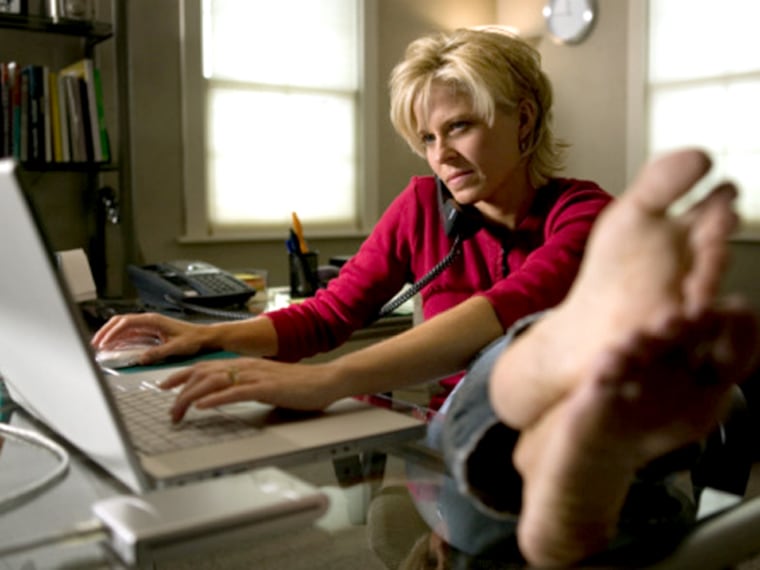For years the workplace commentariat has been nattering about the no-collar workplace. Companies will hire brains, not bodies. Work will go to the talent — instead of the talent extreme-commuting to the work. Teams will go transnational, warming the undersea cables with their space-and-time shifting video meetings. The workplace of the future, they've said, will be no workplace at all. Technology will turn the globe into one giant Wi-Fi-enabled kibbutz. A post-face-time world where everybody can Tivo their work.
This is one of those dreams that has actually panned out. The office — in our pocket! (Or pocketbook!) But for every miraculous solution, there's another problem created. And so it is with the wonder of wireless work.
Five years into the mainstreaming of mobile work, there's a growing enlightenment, buttressed by new research, that the benefits of working remotely are actually a bit more complicated, and nuanced, than the cheerleaders said. In all the effusive rah-rah'ing over this great employee unleashing, many managers overlooked a simple fact: Some of us are simply not — by temperament, psychology, or personality type — wired for the life of the digital nomad.
Indeed, what is to some a broadband Nirvana is to others a Sartre-esque exercise in alienation. "I'll be candid with you: If I work at home for more than two days, I feel a bit isolated," says Cisco European Marketing Manager Tim Stone. "I tend to go to the office a couple of days a week just to have human interaction."
And this from the guy who markets all that Cisco gear that's supposed to make the virtual Valhalla happen. Over the past couple of years, the London-based Stone has become increasingly intrigued by the psychology surrounding mobile work. Was there a genome for the ideal mobile worker? And a genome for one who would fail?
Three years ago, Stone, along with a group of other Cisco execs, hired a U.K.-based outfit called Pearn Kandola to help him, Cisco, and Cisco's clients better understand the deeper psychological issues at play in mobile work. "We really wanted to understand the dynamics around the technologies we were bringing to market," says Stone.
Pearn Kandola is a psychological research-and-consulting outfit staffed with lots of psychiatrists and psychologists who specialize in all things workplace-related. Pearn Kandola began studying hundreds of workers at Cisco as well as other employees at global client companies around the world.
Pearn Kandola's chief researcher, a kindly and upbeat psychologist named Stuart Duff, was shocked at the findings. He assumed it would be the quants, the introverts and the shy types who would thrive in a virtual work situation. After all, they're the ones who keep their heads burrowed in cubicles at work. Turns out it's the extroverts among us who are better suited to going Bedouin. "The penny really dropped for us," he says.
Duff and his researcher colleagues found that it's the employees who chase socialization who thrive in the land of virtual work. The office gabbers. Those who are life of the break-room party. Left on their own, these types of workers are the ones who work closely with clients, chum around with colleagues, and talk it up with bosses. They stay connected no matter where they are. It comes naturally to them.
Duff also assumed that mobile workers would tend to be seat-of-the-pants types who could get away with being disorganized scatterbrains. After all, nobody ever had to see their "offices." For Duff the picture of the disheveled door-to-door salesman living out of the back of his car came to mind. Again, the truth turned out to be the opposite. "Mobile workers are far more organized, personally, than their office-bound counterparts," says Duff. "They have to be on top of their game the whole time."
In offices across the world, Duff saw managers struggling with managing their remote workers. "It's not as easy as simply pushing workers out the door," says Duff. The wrong personality types will flounder. Extroverted curiosity seekers who are quick decision makers and super Type A personalities tend to thrive. "It almost requires a super person," says Duff.
Shy, disorganized types are better kept in-house. Turns out the office environment is more forgiving of the disorganized. Its structures help provide external reinforcement. There's also much to be said for social vibrations that naturally abound in an office. It doesn't require much work to keep up basic relationships when you're all in the same place.
Now, with the benefit of Duff's research, execs such as Cisco's Stone are rethinking managerial best practices. Stone's direct reports are scattered across the globe. Recently he became concerned about one particular employee who either worked from home or in an office with Cisco workers who were in different departments. Stone didn't have much sense of how he was doing and felt telephone conversations weren't allowing them to connect properly. He deliberately started to buddy up this lone-ranger exec with other Cisco execs in the same geographic area.
Cisco's Telepresence, a hyper-realistic video-conferencing system, has also helped Stone stay in face-to-face contact with this more introverted type, who is headquartered in France. "Before, my interaction with him was over the phone every couple of weeks," says Stone.
Any form of video conferencing can help. When managers rely on voice and e-mail communication to reach workers off-site, research has shown that only 7 percent of communication goes through. Systems such as Telepresence convey the tone, body language, and facial expressions that are so crucial to trust and understanding.
Researchers studying bodily reactions found that co-workers on different continents experienced the same chemical responses as they would in face-to-face meetings. Workplace researchers also report that using video conferencing to huddle in short but frequent bursts is far more productive than flying off to some long, drawn-out confab. For some virtual workers, the key to being productive may be to create an office-like environment in cyberspace.
